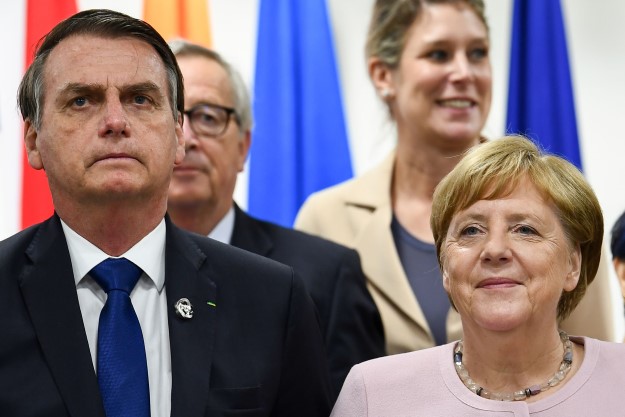Recent international outcry over fires in the Amazon and President Jair Bolsonaro’s defiant response has done more than negatively affect Brazil’s global reputation. The episode has also set in motion a complex debate across Europe about how to react to Brazil’s environmental stance, and whether to go ahead with the ratification of a free trade agreement between the European Union and Mercosur.
Ratification of the accord would lead to a historic deepening of economic and geopolitical ties between Europe and South America. But the deal was thrown in doubt when France’s President Emmanuel Macron, along with Irish Prime Minister Leo Varadkar, made clear they would seek to block ratification of the trade deal unless Brazil’s changed its environmental policy – an unlikely scenario, given how closely intertwined the topic is with Bolsonaro’s political project, and his commitments to his more ideological supporters.
France and Ireland have been skeptical about the trade deal since negotiations began in 1999, as it would strongly affect their agricultural industries. This historic reluctance helps explain why Macron and Varadkar were quick to condition ratification on Bolsonaro’s improbable conversion to an environmentally responsible president.
Yet a far more nuanced and perhaps decisive debate is taking place in Germany. The country stands most to gain economically from the trade deal with Mercosur, but is also home to Europe’s most powerful environmental movement. The results of the German debate over how to react to Bolsonaro’s forest policy will ultimately determine whether one of the world’s biggest trade deals will indeed come to fruition, with far-reaching consequences for Latin America’s largest economy.
The Amazon is already a contentious topic in Berlin. Frankfurter Allgemeine Zeitung, one of Germany’s leading newspapers, notes that the Amazon has a “sacrosanct status” among the country’s environmentalists. Tensions between German Chancellor Angela Merkel’s cabinet members surfaced almost immediately after Brazil recently requested a reduced role for NGOs in the management of the Amazon Fund, a multimillion-dollar conservation scheme financed by the Norwegian and German governments.
In July, Germany’s minister for international cooperation, Gerd Müller, visited Brasília to meet Brazil’s environment minister, Ricardo Salles. Müller voiced concerns, but in public expressed optimism that a solution could be found. Germany’s Environment Minister Svenja Schulze took a harsher stance and announced a funding freeze for environmental projects in Brazil, which, though unrelated to the Amazon fund, created the impression that Germany lacked a unified position.
Schulze’s tough stance was echoed by Germany’s Agriculture Minister Julia Klöckner, who said she could not support ratification of the Mercosur deal unless Brazil changed course. Klöckner added that Germany’s “credibility was at stake” – a position possibly influenced by skepticism among German farmers about the trade deal. Müller shot back publicly, saying that continued engagement was the only way to contribute to protecting the Amazon. Merkel, too, was at pains to defend a less confrontational response, arguing during a heated debate in parliament that “the non-ratification of the (trade agreement) does not contribute to reducing illegal logging in Brazil’s rainforest by a single hectare. Quite to the contrary. That is why I believe that non-ratification must not be the answer to what is happening in Brazil right now.”
The German foreign ministry has been scrambling to salvage the deal, aware not only of the massive economic gains for Germany, but also the urgent need to strengthen Europe’s influence in Latin America, a region that is quickly drifting into China’s orbit. Beijing has refrained from criticizing Brazil’s environmental politics, and even publicly lauded Brazil’s environmental standards in the midst of the crisis. What’s more, it is not lost on Germany’s Foreign Minister Heiko Mass how important the ratification of such a massive trade deal would be to serve as a response to the protectionist wave unleashed by Donald Trump.
Yet privately, those in favor of the deal are exasperated by Bolsonaro’s provocative rhetoric.
“The Brazilian president must understand that many German voters are very sensitive to the images of these fires (in the Amazon), and the way he responded to international criticism makes me wonder whether he is aware of how quickly this could produce a TTIP situation,” a senior diplomat told me during my recent visit to Berlin, referring to the 250,000 Germans who took to the streets in 2015 to protest against a free-trade agreement between Europe and the United States. Back then, all it took to mobilize the population was the image of the “chlorinated chicken” from the United States to kill the deal in the court of public opinion.
Aware of the risk of non-ratification and consumer boycotts of Brazilian products, representatives of Brazilian agribusiness have sounded alarm, trying to convince Bolsonaro to at least moderate his rhetoric. An online public petition in Germany calling for both non-ratification of the trade deal and economic sanctions against Brazil has gathered more than 100,000 signatures. Once companies announce that they will stop buying Brazilian products (as Timberland and H&M recently did), “you quickly see a chain reaction,” an environmental activist in Berlin told me.
In the end, a variety of developments will determine the outcome of the debate in Germany, several of them unrelated to Brazil. The current foreign minister is personally committed to strengthening ties to Latin America and rightly sees the free trade deal as a key pillar of this strategy. If the Social Democrats pull out of the governing coalition government, however – a possibility the party has discussed – new elections could allow the Green party to join a new coalition as a junior member, probably naming the new foreign minister. Other international crises may divert public attention away from the plight of the Amazon forest, reducing opposition to ratification.
Meanwhile, on the Brazilian side, the more pragmatist groups within the government – such as Brazil’s farm lobby and the pro-free trade economy minister – could convince Bolsonaro to adopt a more moderate approach. This would undoubtedly be the biggest step to avoiding the trade deal’s premature death.









